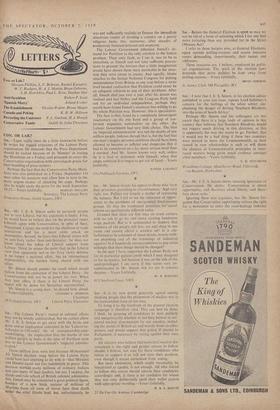SIR,—The Labour Party's record in colonial affairs may not be
wholly unblemished, but we cannot allow Mr. J. E. S. Simon to get away with the facile and quite untrue implication contained in his 'Lahore-to- lullundur-is-1/0-miles bit of oneupmanship-cum- mudslinging : the implication that the deaths of one million people in India at the time of Partition were due to the Labour Government's 'imperial adminis- tration.'
Those million lives were lost because Mohammed Ali Jinnah decided—long before the Labour Party could have had anything to do with it—that Muslims and Hindus could not live indefinitely in peace. This decision startled many millions of ordinary Indians and also many of their leaders, but not, I suspect, the divide-and-rule school of British colonial administra- tors. Jinnah may be considered a great political figure, founder of a new State, saviour of millions of Muslims from all sorts of worse fates than death under the cruel Hindu heel, but, unfortunately, he was not sufficiently realistic to foresee the immediate disastrous results of dividing a country on a purely religious basis, this, moreover, after decades of assiduously fostered mistrust and suspicion. The Labour Government inherited Jinnah's de- mand for Partition as the only solution to the Indian problem. Their only fault, as I sec it, was to be as unrealistic as Jinnah and not take sufficient precau- tions to prevent the horrors that a little imagination would have shown them were inevitable in the situa- tion they were about to create. And equally, blame attaches to the Indian National Congress for putting independence from Britain at any cost before a more level-headed realisation that Partition could never be an adequate solution to any of their problems. After all, Jinnah died just over a year after his dream was realised and had Nehru and the Congress Party held out for an undivided independence, perhaps they would have found Jinnah's successor less willing to go thc, whole Pakistan way. However, this is speculation.
The fact is that, faced by a completely intransigent reactionary on the one hand and a group of too- fervent impatient nationalists on the other, the Labour Government had very little choice. The blot on 'imperial administration' was not the deaths of one million people, hideous though that is, but the fact that one man's largely personal ambition should have been allowed to become so inflated and dangerous that it had to be considered on a far more serious level than it merited. And Mr. Simon knows very well, unless he is a fool or dishonest with himself, when that single ambition first began to get out of hand.--Yours faithfully,






































 Previous page
Previous page